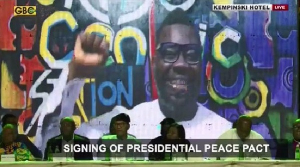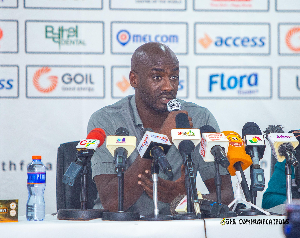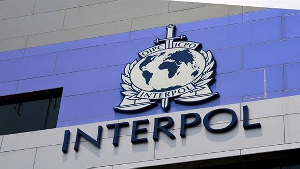Today, at the University of Ghana (UG), Legon, an important seminar on literature will take place.
The theme is, ‘Radio – a platform for literature: Ghanaian literary broadcast cultures’.
The speakers are Prof Helen Yitah, Prof Audrey Gadzekpo and Dr Victoria Smith, all of UG.
On such an occasion, an opportunity arises for a national introspection on the literary discourse of our political actors and their civil/public servant appointees, since an inordinate amount of radio time is devoted to them as news sources/newsmakers.
Most of Ghana’s political debates take place on radio, with political party spokespersons and PROs explaining government policies whose formulation they know next to nothing about.
These debates are a daily radio theatre from 6-10am on average from Monday through Friday.
There is a bonus review programme on Saturdays, lasting three hours.
On a regular basis, Ghana’s communications professionals working within government institutions have been struggling through a series of internally organised seminars to find solutions.
Communicating ideas or solutions should be part of the training at the bachelor’s and master’s level for every university graduate.
Obviously, that is not done effectively, that is why there are complaints about government communicators not doing their work well.
The technocrats should be trained on how to write and push their ideas through the media.
Kwame Nkrumah was writing through the Evening News. JB Danquah likewise was writing regularly.
Writing itself helps us to think logically. It enables readers to assess our consistency and logic, and thereby enable them to make informed judgments.
We at writersghana.com will respectfully suggest that all the directors of government agencies should be trained in communications so that they can engage the media directly; they should head their communications teams.
Listening to the presenters at a recent government communications seminar, it became clear that they are able to identify many of the problems.
But for obvious reasons, they duck and leave the PROs to face reporters and interviewers.
Meanwhile, many of these reporters and interviewers themselves have had only about six months of twice-weekly training in broadcasting and voice training; beyond that, they do not know anything!
So why do we fear their microphones? Or rather is it their questions we fear because we ourselves do not do the right things?
Ironically, many of the media schools these media people were trained in will not even meet certification standards set by our own Ghanaian regulatory agencies, let alone international standards.
Are we not ashamed that Rwanda and Burundi have overtaken Ghana in terms of quality education?
That we are now trading equal places with Sudan?
Writersghana.com will urge all communicators and directors within Ghanaian institutions to put their thoughts out there through regular writing.
And they should also engage qualified professionals from the Bureau of Ghana Languages/Ghana Institute of Languages to do the local language translation jobs for them.
And then let discerning people be the judges.
An article published on usatoday.com by Daniel Lefferts on 10 July, 2014 gives the clearest picture of why Ghana scores zero percent with respect to the influence our politicians wield through writing.
Lefferts lists Winston Church at number one out of seven most influential writers who were politicians. His list includes Abraham Lincoln, Ulysses S. Grant, Benjamin Disraeli, Theodore Roosevelt, Vaclav Havel and Barack Obama.
For Churchill, politics and literature were two sides of the same career,’ Lefferts quoted Jonathan Rose as saying.
Since Churchill introduced free secondary school in Great Britain after the second world war with his literary and public speaking skills through the House of Commons, let us stay with him a little longer.
Perhaps he is relevant in Ghana’s quest to establish Free Secondary School education more than 70 years after he did that.
‘The British prime minister was a theater nerd in his youth and, over the course of his career, wrote a number of books, including military histories, essay collections and fiction. Regarded for his prolificness as well as his prose, he understood history (even the chapter of it in which he was a main player) as a story, and his politics were not immune to literary influences,’ wrote Lefferts.
‘This was especially true in, of all things, matters of science. [Jonathan] Rose recounts one episode in which Churchill, writing a newspaper article about the future uses of science and nuclear fusion in particular, “cited (H.G.) Wells and copied his conviction that scientists were a revolution”….. ‘In addition to keeping literature alive in the minds of the public, Churchill also made his own contribution to the literary record of his era,’ wrote Lefferts on usatoday.com.
Are there any Ghanaian politicians who wrote regularly or who have any serious literary influence through radio?
The notable exceptions were Kwame Nkrumah and JB Danquah.
In the history of today’s fourth Republic, Dr Nii Armah Josiah-Aryeh stands out.
Of those who were writers in the press but stopped when they got political office, Joe Aggrey, a sports writer, who became deputy sports minister from 2001 to 2005 and Prof Kwesi Yankah, the current minister for tertiary education, who wrote the weekly column “Woes Of A Kwatriot” and stopped in 2001, are the most popular.
Elizabeth Ohene, who served in various roles during the Kufuor administration from 2001 to 2009, is writing regularly for the BBC, her former employer and in the Ghanaian press even though her party is in power, and that is brave of her. Dr Gyeshika Agambila who was a deputy minister under Kufuor is another prolific writer who writes while in and out of government.
So how do we get directors, senior appointees and the ministers themselves to write and explain their own policy choices since they themselves admit both publicly on radio and in private that government communication is a minefield?
One way, is to teach them how to write. But that will be a tall order.
What will be my mentor’s response to that?
‘These people fly by the seat of their pants…. IF YOU DO NOT READ, YOU CANNOT WRITE.’
Another way, is to sack those who are not thorough in explaining government policy and appoint academics to head vital institutions. What will be my mentor’s response to that?
‘Today, the term Ghanaian academic is an oxymoron.’
Is it not true? It is! If you are not reading and adding to your own knowledge, what can you write?
According to unpublished data by Ghana’s Ministry of Education, the average annual publication per Ghanaian lecturer is 0.5; that is, it takes two years to get one publication out of a lecturer, however loosely the term publication is defined!!!
Yesterday, after my lecture, a male student walked to me and told me he realized I was so serious about writing that I made it appear that if you were not writing, then you were not part of the university.
Well, I hope he has got his answers from this article.
But let us top it up with a quote from the respected PISA rankings organised by Organisation for Economic Cooperation and Development (OECD) when they tried assessing non-OECD members.
‘Among the countries compared, Ghana has the lowest enrollment rate in secondary schools (46%) and also the lowest achievement levels for those 15 years or older who are in school (291 PISA points). While it is difficult for Ghana to meet the goal of universal basic skills anytime soon, if it did, it would see again over the lifetime of its children born today that in present value terms, is 38 times its current GDP.’
There we have it; poor reading and writing skills have a serious negative economic impact!
It is clear now that Ghana’s policy communication problem – not just government communicators’ problem – lies in reading and writing.
Feedback; ato@writersghana.com; LinkedIn, Isaac Ato Mensah; Instagram, @Atomenswriters; Twitter, @atomens; Facebook, Isaac Ato Mensah; Telegram, Isaac Ato Mensah; Quora, Isaac Ato Mensah; WhatsApp, (+233) 020 022 0353.
Opinions of Monday, 1 April 2019
Columnist: Isaac Ato Mensah



















